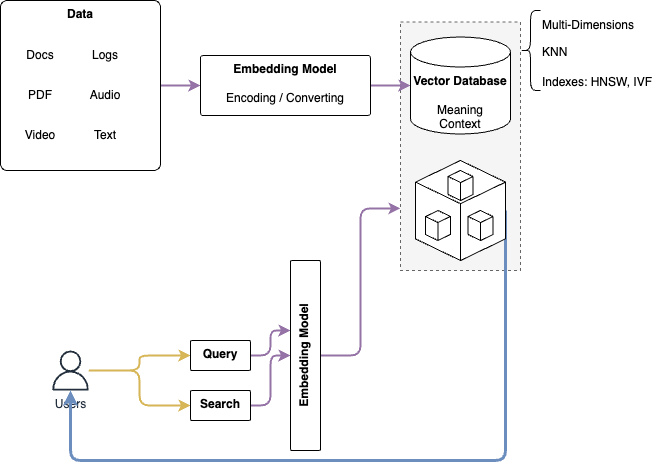Learning Vector Database
Thoughts of Learning Vector Database
- The motivation of this thoughts that trying to discover the LLMs and Generative AI
- In order to create or build, train any models there are multiple factors will need to be considered: lakes of data, metadata, data management, infrastructure, etc.
- Vector Databases are used like underlying of Gen AI
- Where everything are tokenized, vectorized and serialized into a single language
- Explored blog posts, articles from AWS
CHANGELOG
- [2024-03-12] Initial version
- [2024-03-27] Update Video
Key Notes
Learning Notes
Watch this video for having thoughts How Gen AI and LLMs use Database - Vector Database
- Data from internet/database/users are inputted and converted and encoded (video, speech, images, text, etc.) to a vector using a vector embedding model such as Gemini, OpenAI, etc.
- Developing Products: Drant, Milvus, redis, pgvector(extension), pinecone, LanceDB, oracle, MongoDB(atlas), AthenaDB
- Different with Relation DB where in Vector Database has multiple dimensions (legacy from multi-dimensional data model)
- Data structure: save the vector; don’t define the structure for the table.
- How to query data? Query the vector that is similar to others in DB base on algorithms (KNN and could be different/better model as I think)
-
Indexing the data in the database, Indexing Algorithms: Flat, HNSW, IVF ==> I think we have room for optimizing the caches and indexes.
- Working flow of Vector Database with Gen AI:
- An embedding model converts the data to a vector data structure. (We need to optimize the algorithm for the huge of parameters)
- Convert the input(end-user) to a vector.
- Querying data in the database.
- Compare the query vector with the database/cache to find out the resources in the DB
- Diagram to describe the Working Flow

- Benefits:
- Flexibility: schemaless, non-structured
- Scalability: bucketing data, dynamic programming
- Speed/ performance: Search vector
- Standardization: formatting all data into a single format
- Use cases:
- Feeding Realtime data for LLMs models
- Resolving searching problems
- Serving Video/Image recognition problems
- Better similarity recommendation with contexts and situations
- Technical Challenges:
- Performance: indexing for Flat (elastic search, redis, pgvector) querying using vector
- Optimize long-term caching memory
- Hardware optimization for hosting and computing data
- Improve KNN performance models